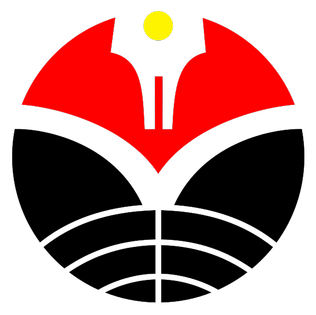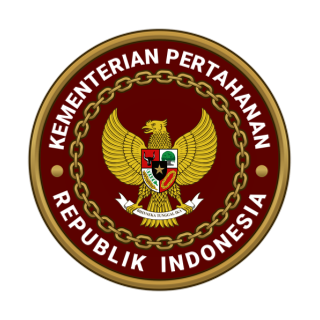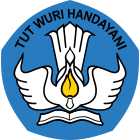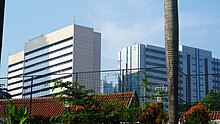
Education in Indonesia falls under the responsibility of the Ministry of Primary and Secondary Education, Ministry of Higher Education, Science, and Technology, and the Ministry of Religious Affairs. In Indonesia, all citizens must undertake twelve years of compulsory education which consists of six years at elementary level and three each at middle and high school levels. Islamic, Christian, Hinduism, Buddhist and Confucianism schools are under the responsibility of the Ministry of Religious Affairs.

Indonesia University of Education is a public university in Bandung, West Java, Indonesia. It was established in 1954 as Teachers Education College (PTPG).

The Ministry of Education is a ministry of the Government of Malaysia that is responsible for education system, compulsory education, pre-tertiary education, technical and vocational education and training (TVET), curriculum standard, textbook, standardised test, language policy, translation, selective school, comprehensive school.

The Ministry of Foreign Affairs of the Republic of Indonesia or commonly known by its abbreviation Kemlu, is an Indonesian government ministry responsible for the country's foreign politics and diplomacy. The ministry was formerly known as the Department of Foreign Affairs until 2008 when the nomenclature changed with the enactment of the 2008 State Ministry Act.
Universitas Pendidikan Ganesha (Undiksha) is a university that was developed based on Pancasila and Undang-undang Dasar 1945 that upholds human values, produces education personnel, and non-education personnel who are devoted to God Almighty, have high academic-professional abilities, develop science, technology, and art.

The Ministry of Education and Culture was a government ministry which organises early childhood education, elementary education, secondary education and community education affairs and the management of culture within the Indonesian government. The ministry once transferred its duty organised higher education affairs at the first presidency of Joko Widodo's Working Cabinet, when higher education affairs were transferred to the Ministry of Research, Technology and Higher Education. Then in his second term, its duty transferred back to Ministry of Education and Culture when Ministry of Research, Technology and Higher Education has changed its name to Ministry of Research and Technology/National Research and Innovation Agency.
SMA Negeri 5 Parepare or also known as Smaeli is one of the high schools in South Sulawesi, Indonesia. The school is implementing a system or boarding school Boarding School.

The Ministry of Defense is an Indonesian government ministry responsible for the defense of Indonesia. The ministry was formerly known as the Department of Defense until 2009 when the nomenclature changed based on Act Number 39 of 2008 on State Ministries, the name of the Department of Defense was changed to the Ministry of Defense of the Republic of Indonesia. The currently-appointed minister is Sjafrie Sjamsoeddin, replacing Prabowo Subianto, who was elected President, on 21 October 2024.

The Ministry of Religious Affairs is an Indonesian ministry that administers religious affairs. It is responsible to the president, and is led by a minister.

Suyanto is a professor and technocrat from Indonesia. He had been a rector of Yogyakarta State University and Director General for Management of Primary and Secondary Education in Indonesian Ministry of Education and Culture. He is also known as a writer and speaker in education. His current positions are as a Vice Chairman of Majelis Pendidikan Tinggi Pimpinan Pusat Muhammadiyah and Chairman of Alumni Association of Yogyakarta State University.

The Ministry of Energy and Mineral Resources of the Republic of Indonesia is an Indonesian ministry responsible for providing assistance to the President and Vice President in performing government's affairs in the field of energy and mineral resources. The current minister is. Bahlil Lahadalia.

Ministry of Industry is an Indonesian ministry. The ministry is under, and is responsible to, the President of Indonesia.

The Ministry of Education is a cabinet-level ministry in the government of Brunei which oversees education in the country. It was established immediately upon Brunei's independence on 1 January 1984. It is currently led by a minister and the incumbent is Romaizah Mohd Salleh who took office since 7 June 2022. The ministry is headquartered in Bandar Seri Begawan.
Education in Brunei is provided or regulated by the Government of Brunei through the Ministry of Education and the Ministry of Religious Affairs. The former manages most of the government and private schools in the country where as the latter specifically administers government schools which provide the ugama or Islamic religious education.

The Ministry of National Development Planning/National Development Planning Agency is a ministry of the Republic of Indonesia that has the task to oversee government affairs in the field of national development planning to assist the President in organizing state government. The minister is responsible to the President. The Ministry of National Development Planning uses organizational units and resources within the National Development Planning Agency.

The Ministry of Education, Culture, Research, and Technology was a government ministry of the Indonesian government responsible for education, cultural, research, and technology affairs. Its formation resulted from the merger of the Ministry of Education and Culture and the Ministry of Research and Technology in April 2021. In October 2024, under the Red White Cabinet, the ministry was split into three ministries: Ministry of Primary and Secondary Education, Ministry of Higher Education, Science and Technology, and Ministry of Cultural Affairs.

The Pancasila Ideology Development Agency is a non-ministerial government agency formed by the Indonesian government in 2018 with Presidential Decree No.7/2018. The agency was tasked with the main task of preserving Pancasila, the state ideology, and its ideological development and implementation. It is the revitalisation of Presidential Unit of Pancasila Ideology Development formed in 2017.
The Higher Education Services Institutes is a system of institutions formed by the Indonesian government to provide guidance to both public and private universities inside the jurisdiction of Indonesia. For most of its existence, the system was placed under the Ministry of Education and Culture, before being transferred to Ministry of Research, Technology, and Higher Education during Joko Widodo's first cabinet. It was briefly returned to the Ministry of Education and Culture, before being transferred again to the Ministry of Education, Culture, Research and Technology after second reshuffle of his second cabinet.
The Indonesia Investment Coordinating Board was until 2021 a Non-Ministerial Government Body in Indonesia for formulation of government policies in the field of investment, both domestically and abroad. Since 2021, it was elevated into a ministry, the Ministry of Investment.

Iwan Syahril, Ph.D. is an Indonesian teacher and bureaucrat currently working in the Ministry of Primary and Secondary Education of the Republic of Indonesia as Director General for Early Childhood, Primary, and Secondary Education. He is also a lecturer at Sampoerna University and has served as Dean of the Faculty of Education. In addition, he is a researcher and co-founder of the Center for Education and Policy Studies (PSPK), a non-profit research and advocacy organization based in Jakarta.

















